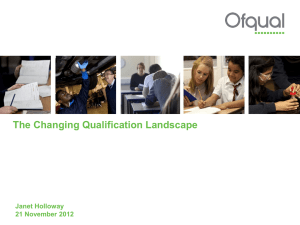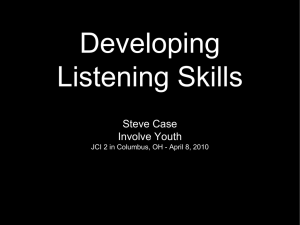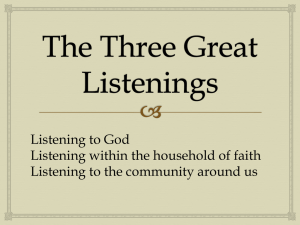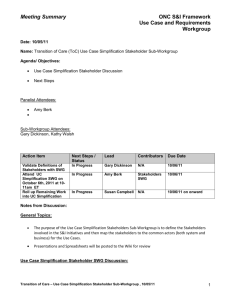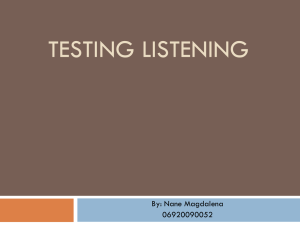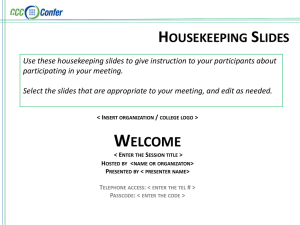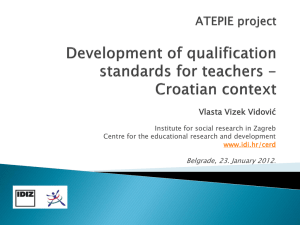Modern Languages: new qualifications
advertisement
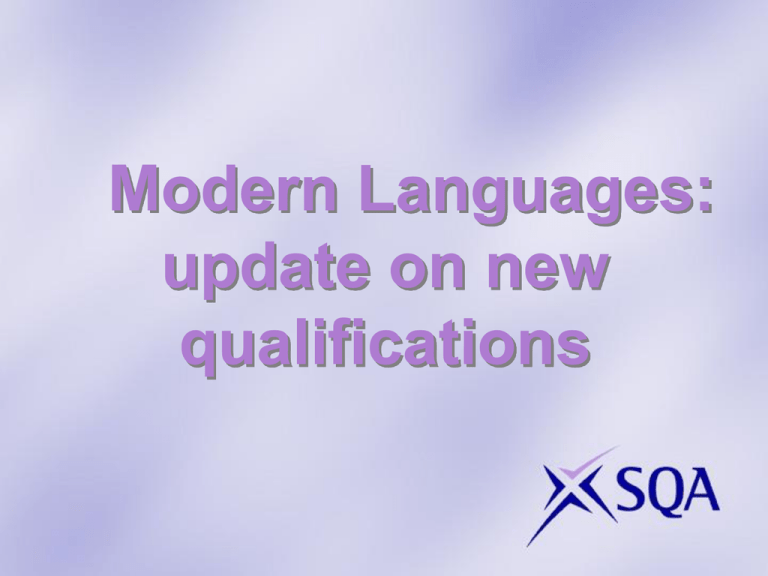
Modern Languages: update on new qualifications New National Qualifications ♦ Support learning – assessment follows the curriculum ♦ Support aims, purposes and principles of Curriculum for Excellence ♦ Provide progression from Experiences and Outcomes and maximizes curriculum continuity between levels ♦ Build on existing strengths of reputation, standards, reliability and validity of Scottish qualifications ♦ Provide more flexibility and choice ♦ Support teacher professionalism ♦ Enable the sharing of standards How we have developed qualifications Qualifications developed in a more strategic way – starts with learning, process is iterative Each stage informs the next – on-going process of exploring issues/developing thinking, seeking advice/guidance and then testing proposals Open and transparent – draft documents published at each stage (both for information and feedback) Wide range of engagement – from formal groups to Liaison Team visits to target activities Ongoing engagement – feedback from web Robust quality assurance – involving partners at each stage Timelines Draft AH Unit Specifications – September 2012 Further Information on Course Assessment – October 2012 Subject-specific events – Autumn/Winter 2012/13 Assessment support and exemplification – October onwards Key Features • Units are points of assessment and skills-based • Broad contexts of society, learning, employability and culture. National 3 National 4 National 5 Higher Understanding Language Understanding Language Understanding Language Understanding Language Using Language Using Language Using Language Using Language Added value — assignment Course assessment Course assessment Modern Languages - Key Features provides progression from Modern Languages Experiences and Outcomes and same Course structure and Unit titles National 3 - Higher will allow learners to draw on, combine and apply the language skills learned throughout the Course in the Added Value Unit Modern Language Assignment provides flexibility to apply language skills in contexts relevant to learners, such as social media, job-related topics or through thematic approaches provides opportunities to use a range of contexts provides opportunities to combine skills Unit Assessment Support Packages Package N3 N4 N5 1 – October 2012 Combined: L&T R&W Combined: R&T L&W Combined: L&T R&W 2 - March 2013 Unit-by-Unit: R&L T&W Unit-by-Unit: R&L T&W Unit-by-Unit: R&L T&W 3 – April 2013 Unit-by-Unit: R&L T&W Combined: R&W L&T Combined: R&T L&W Added value at National 4: Assignment Assessing the skills of reading, listening & talking guidance on setting and controlling the assessment Guidance on making assessment judgements Personalisation and choice Support notes and assessment exemplification: guidance on overtaking other Unit outcomes Added Value at National 5: Course Assessment Assessing the skills of reading, writing, listening & talking Question Papers: Reading – 3 texts (of same length) Listening – 1 monologue, 1 conversation Writing – job e-mail Performance: Talking – presentation and conversation Added value at Higher: Course Assessment Assessing the skills of reading, translating, writing, listening & talking Question Papers: Reading – 1 text, including translation Directed Writing – choice of four scenarios (one from each context) Listening – 1 monologue, 1 follow-up conversation Personal Response – stimulus based on Listening Performance: Talking – presentation and conversation Modern Languages for Life and Work Award Available at SCQF levels 3 and 4 Practical and relevant contexts Personal development – employability skills 3 Units, 2 of which existing SQA Units Opportunity to use 2 languages in one qualification Available to Centres August 2012 Available to all pupils of all ages Award Support Notes available on secure site Course and Unit Support Notes Access 3- Higher • These provide guidance on delivering Units and Course. • Approaches to learning and teaching and assessment • Gathering naturally-occurring evidence • Combining Outcomes within and across Units • Useful appendices Advanced Higher Course structure and Units same as current Contexts of society, learning, employability and culture Open up types of text for internal unit assessment for ERV to include media texts Emphasis on topical issues Draft Unit Specifications published end of September 2012 Development Process NEXT PHASE: ASSESSMENT Assessment Support Assessment Briefs – all levels N3-N5 Unit assessments – combined across Units and unit only Added Value Unit & making Assessment Judgements information Specimen Question Papers & Marking Instructions Specimen Coursework & Marking Instructions April 2013 Who Enhanced Subject Working Group: Qualification Development Manager Qualification Development Consultant Qualification Manager/Qualification Officer Principal Assessor Item Writers Principal Verifier Subject expertise from CARG/QDT/SWG Quality Assurance and Engagement Internal Review of Courses Coordination Group Languages Curriculum Area Review Group QDT English, Gàidhlig, and Literacy QDT ESOL Sub-QDT Sub-QDT Enhanced SWG Enhanced SWG QDT Latin sub-QDT Enhanced SWG QDT Media QDT Modern Languages Sub-QDT Sub-QDT Enhanced SWG Enhanced SWG


